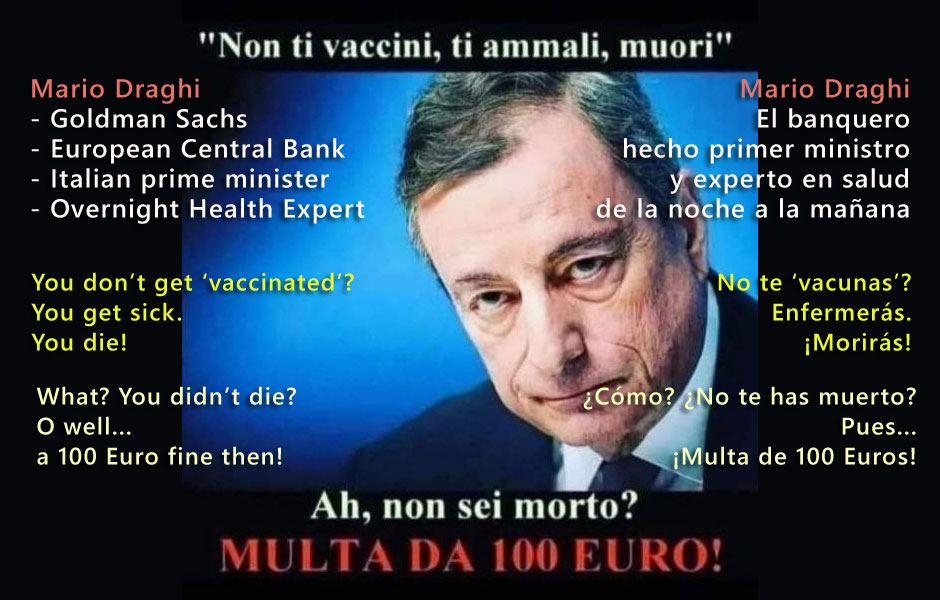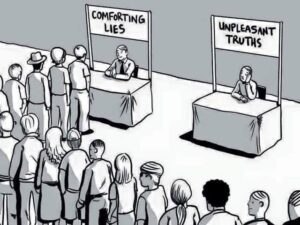The EU Commission, as both prosecutor and judge in mass censorship starting from 25 August 2023
(artificial translation, not yet checked by Human)
On August 25th, a censorship regime will come into force in the EU, the likes of which we have not seen since the 1920s to 1940s. Or if you want since the Middle Ages, only with virtual pyres. This is the Digital Services Act, which will prevent any expression of opinion on the major platforms that the EU Commission does not like.
Some fluffy statements about protection against hate speech or child pornography are often used in the justifications. The focus, however, is on the suppression of “false or disinformation”. Terms such as truth or lies or untruth are no longer used
“False information” is the vocabulary of a culture that has lost its ability to discuss “truth.” The perversion of truth is untruth; Misinformation is just the perversion of information.
In Orwell’s 1984 there was still a hypothetical “Ministry of Truth”. But Orwell’s satirical title gives too much credit to the language police: he assumes “truth” is still a working part of their vocabulary. Our censors speak of “misinformation”.
Plato said the “true philosophers” are those “who love the vision of truth,” which he described in terms of an ideal reality that transcends the imperfect reflections of truth, goodness, and beauty in the natural world.
So who in the EU will define what actually counts as misinformation or disinformation?
According to the theory of the separation of powers in the legislative, executive and judiciary, this should be the task of an independent regulatory authority or a judicial authority that at least has clear procedural parameters and no or only few conflicts of interest. That is natural in a democracy. Or?
Not in the EU.
The final decision on what constitutes misinformation or disinformation, potentially not only in the EU but in several jurisdictions around the world, will be made by the European Commission. Right, the unelected, power-hungry, corruption-plagued, von Leyen-led EU executive. The same institution that is in the process of wrecking the EU’s economic future with its endless, backfiring sanctions against Russia, and that is embroiled in Pfizergate, one of the biggest corruption scandals in its 64-year history. Now the Commission wants to bring mass censorship to a level not seen in Europe for decades.
In this task, the Commission will, in its own words, “have enforcement powers similar to those in antitrust cases”, adding that “an EU-wide cooperation mechanism will be put in place between national regulators and the Commission”.
The Electronic Frontier Foundation (EFF) supports many aspects of the DSA, including protecting users’ rights to privacy by prohibiting platforms from targeting advertising based on sensitive user data such as sexual orientation or ethnicity. “More broadly, the DSA increases the transparency of the ads users see in their feeds, as platforms are required to place clear labeling on each ad, with information about the ad buyer and other details.” It also reins in “the power of big tech” by forcing them to “comply with sweeping commitments and responsibly address systemic risk and abuse on their platforms.”
But the EFF also warns that the new law “provides a fast-track procedure for law enforcement agencies to take on the role of ‘trusted trusted warners’, uncovering data on anonymous speakers and removing allegedly illegal content – obliging platforms to remove it quickly .” The EFF is also concerned about the dangers posed by the Commission’s leading role in all of this:
Issues with government involvement in content moderation are pervasive, and while trusted alerters are not new, the DSA’s system could have a significant negative impact on users’ rights, particularly privacy and freedom of expression.
Freedom of expression and a free press are the cornerstones of any true democracy, as required by fundamental and human rights and as the American Civil Liberties Union (ACLU) states:
The First Amendment protects our freedom to speak, assemble, and associate with others. These rights are essential to our democratic system of government. The Supreme Court has written that freedom of expression is “the matrix, the sine qua non for almost every other form of liberty”. Without them, other fundamental rights, such as the right to vote, would no longer exist. Since its inception, the ACLU has advocated full protection of our First Amendment rights in time of war and peace to ensure that the marketplace of ideas remains vibrant and unrestricted.
This amendment to the constitution recently led to a judge, at the request of the attorneys general of Louisiana and Missouri, even banning the US federal authorities from even speaking to the operators of platforms.
It’s different in the EU on the way, democracy is disruptive in the power frenzy.
Found at: https://t.me/ScarletFranciniItaly/16462
Translated from: https://tkp.at/2023/07/10/eu-kommission-als-anklaeger-und-richter-bei-massen-zensur-ab-25-august/
.





